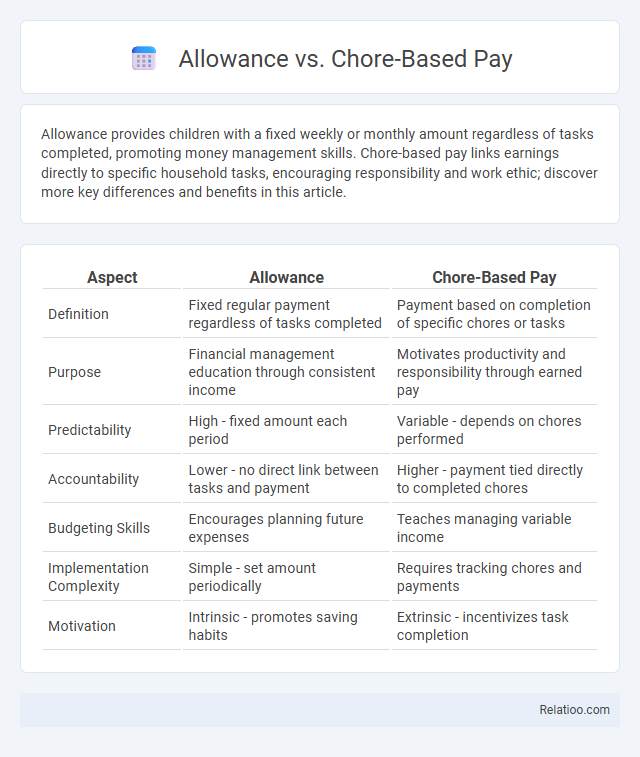Allowance provides children with a fixed weekly or monthly amount regardless of tasks completed, promoting money management skills. Chore-based pay links earnings directly to specific household tasks, encouraging responsibility and work ethic; discover more key differences and benefits in this article.
Table of Comparison
| Aspect | Allowance | Chore-Based Pay |
|---|---|---|
| Definition | Fixed regular payment regardless of tasks completed | Payment based on completion of specific chores or tasks |
| Purpose | Financial management education through consistent income | Motivates productivity and responsibility through earned pay |
| Predictability | High - fixed amount each period | Variable - depends on chores performed |
| Accountability | Lower - no direct link between tasks and payment | Higher - payment tied directly to completed chores |
| Budgeting Skills | Encourages planning future expenses | Teaches managing variable income |
| Implementation Complexity | Simple - set amount periodically | Requires tracking chores and payments |
| Motivation | Intrinsic - promotes saving habits | Extrinsic - incentivizes task completion |
Understanding Allowance: Definition and Purpose
Allowance refers to a fixed sum of money given regularly to children by parents to teach financial responsibility and budgeting skills. It is intended as a tool for learning money management rather than a direct reward for specific tasks. Unlike chore-based pay or chore compensation, an allowance is not necessarily tied to completing household duties, emphasizing consistency over performance.
What is Chore-Based Pay?
Chore-based pay is a system where children receive monetary rewards specifically for completing designated household tasks, linking effort directly to financial compensation. Unlike a fixed allowance that is given regularly without conditions, chore-based pay incentivizes responsibility by assigning value to individual chores. This method encourages work ethic and financial literacy by teaching children the correlation between labor and earnings.
Key Differences Between Allowance and Chore-Based Pay
Allowance provides children with a fixed amount of money regularly, independent of completing household tasks, promoting financial responsibility and budgeting skills. Chore-based pay rewards your child only after completing specific chores, directly linking effort to earnings and reinforcing accountability. The key difference lies in motivation: allowance encourages money management, while chore-based pay incentivizes task completion through immediate compensation.
Pros and Cons of Giving Kids an Allowance
Giving kids an allowance fosters financial literacy and independence while teaching budgeting skills through regular, predictable income. However, it may reduce motivation to contribute to household chores if not linked to chores, potentially fostering entitlement. On the other hand, chore-based pay or chore compensation directly ties earning to work, reinforcing responsibility but could undermine intrinsic motivation to help the family.
Advantages and Drawbacks of Chore-Based Pay
Chore-based pay motivates children by directly linking effort to earnings, fostering a sense of responsibility and money management skills. However, it may reduce intrinsic motivation by making chores feel like work rather than contributions to family life and can create disputes over fairness or task value. Parents must balance ensuring accountability with encouraging voluntary participation to avoid dependence on financial rewards.
Impact on Financial Literacy and Responsibility
Allowance teaches Your child basic money management by providing a fixed amount regularly, encouraging budgeting and saving habits. Chore-based pay links earnings directly to task completion, fostering a strong sense of accountability and work ethic, while chore compensation offers flexible rewards that can motivate effort but may hinder consistent financial planning. Understanding these approaches helps tailor strategies that enhance financial literacy and instill lasting responsibility in children.
Encouraging Work Ethic: Which Method Works Best?
Chore-based pay directly links tasks to earnings, motivating consistent effort through clear rewards, while allowance provides a fixed sum encouraging money management rather than task completion. Chore compensation offers flexibility by rewarding extra effort beyond routine duties, fostering a strong work ethic and responsibility. Choosing the right method depends on how you want to balance incentive with financial education and personal accountability.
Age Appropriateness for Each Approach
Allowance suits younger children by teaching basic money management with a fixed sum unrelated to tasks, fostering responsibility without pressure. Chore-based pay fits older children capable of completing specific tasks, linking effort with earnings to motivate work ethic and accountability. Chore compensation applies to teenagers or young adults, offering payment for additional or complex duties, encouraging financial independence and real-world job experience for Your growing maturity.
Parental Perspectives and Common Practices
Parental perspectives on allowance, chore-based pay, and chore compensation often vary based on goals such as teaching financial responsibility or encouraging household participation. Allowance typically serves as a fixed weekly or monthly sum unrelated to chores, promoting financial literacy, while chore-based pay directly links earnings to task completion, reinforcing work-reward concepts. Common practices reveal that chore compensation models may blend both approaches, balancing consistency with performance incentives to motivate children effectively.
Finding the Right System for Your Family
Choosing between allowance, chore-based pay, and chore compensation depends on your family's values and financial goals. An allowance offers consistent income promoting financial literacy, while chore-based pay ties earnings directly to completed tasks, incentivizing responsibility and effort. Your ideal system balances motivation with fairness, ensuring children learn the value of money and work without creating conflicts.

Infographic: Allowance vs Chore-Based Pay
 relatioo.com
relatioo.com